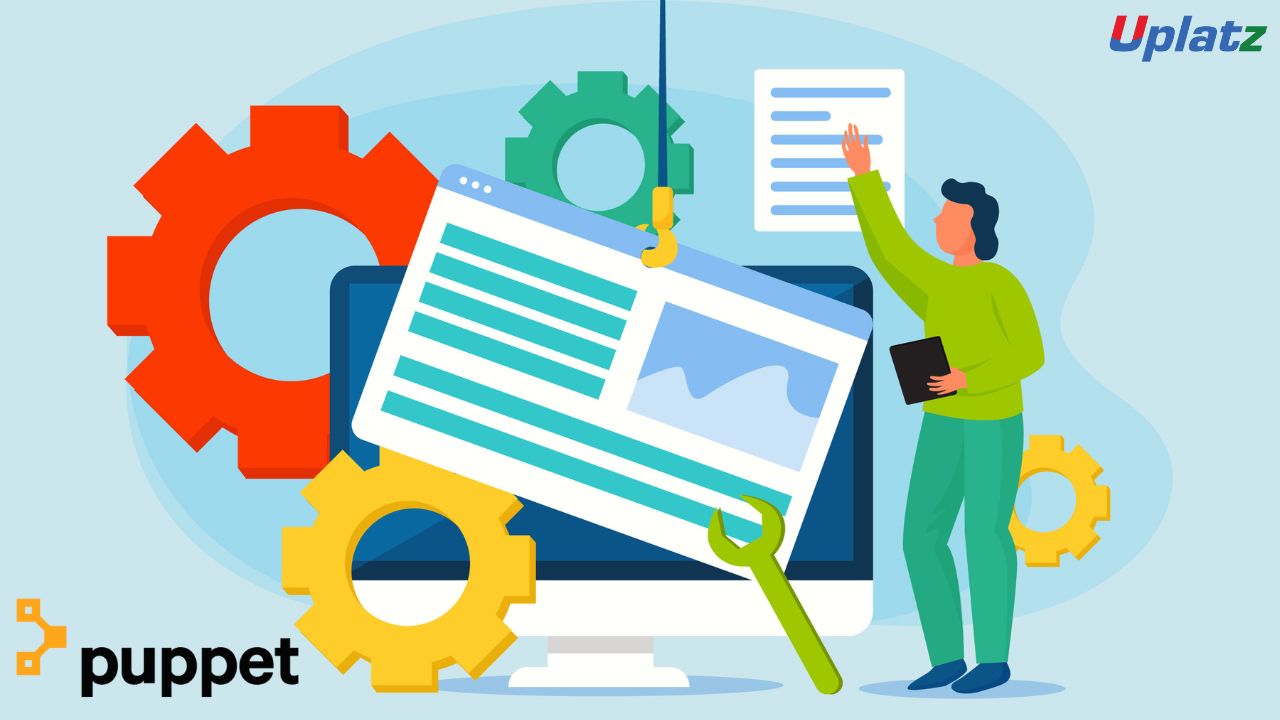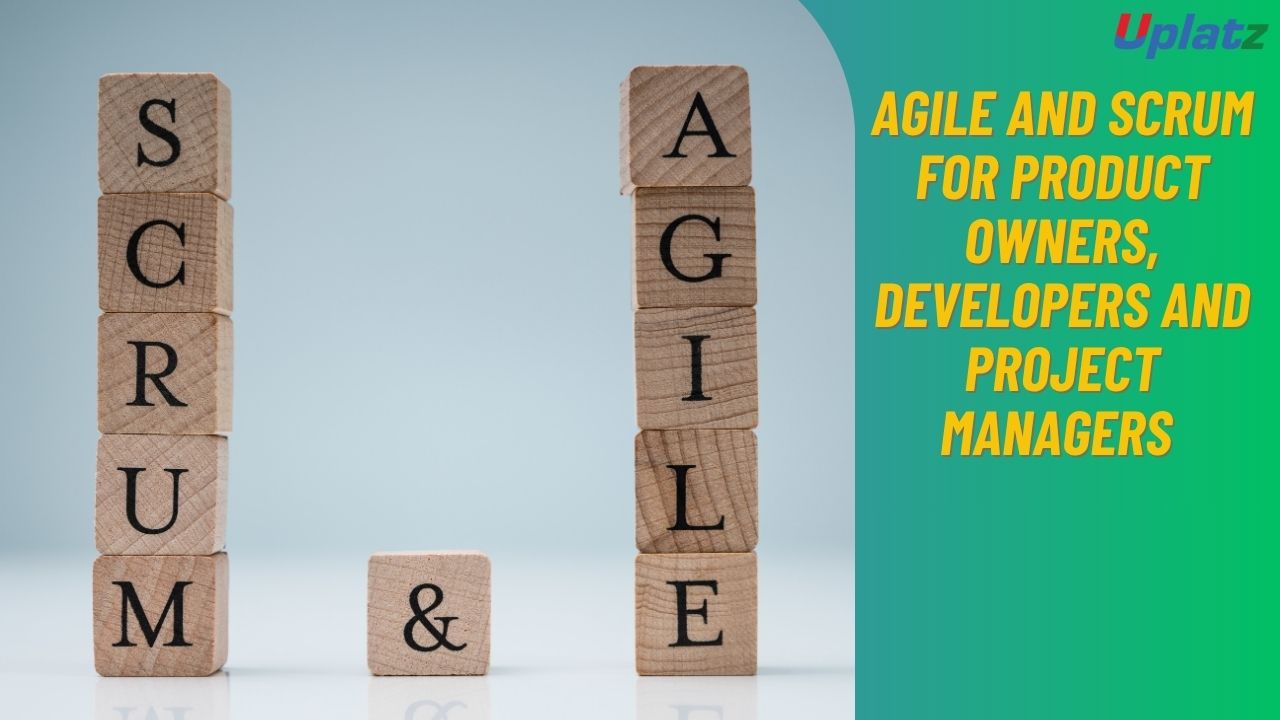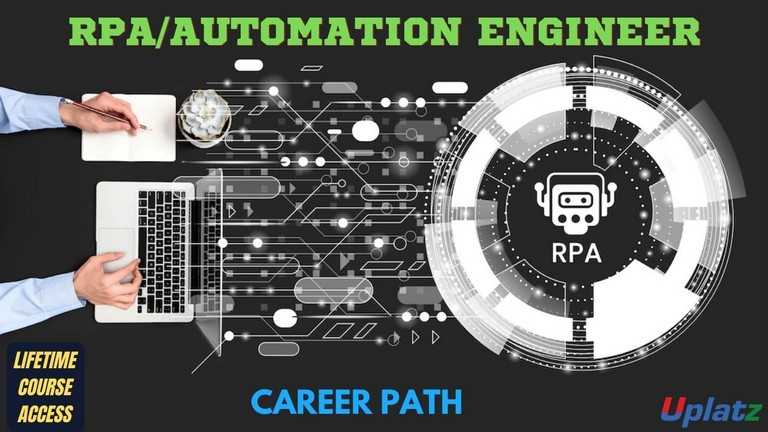Ansible
Learn Ansible from scratch and automate infrastructure, application deployment, and configuration management with powerful YAML-based playbooks.
Course Duration: 10 Hours
Preview Ansible course
Price Match Guarantee Full Lifetime Access Access on any Device Technical Support Secure Checkout Course Completion Certificate 92% Started a new career
BUY THIS COURSE (
92% Started a new career
BUY THIS COURSE (GBP 12 GBP 29 )-
 85% Got a pay increase and promotion
85% Got a pay increase and promotion
New & Hot
Trending
Job-oriented
Coming soon (2026)
Students also bought -
-

- Puppet: Automating Infrastructure Configuration at Scale
- 10 Hours
- GBP 12
- 10 Learners
-

- Agile and Scrum
- 27 Hours
- GBP 12
- 880 Learners
-

- Career Path - RPA and Automation Engineer
- 100 Hours
- GBP 32
- 299 Learners

Ansible - Mastering IT Automation and Configuration Management – Online Course
Ansible is a hands-on, project-based course designed for system administrators, DevOps engineers, cloud architects, and IT professionals who want to streamline the management of infrastructure using Ansible, one of the most popular open-source automation tools.
Ansible offers a radically simple automation platform that enables infrastructure as code (IaC), application deployment, configuration management, and orchestration—all using human-readable YAML templates called playbooks. Its agentless architecture (using SSH) and push-based model make it exceptionally lightweight and easy to adopt, compared to tools like Puppet or Chef that require agent installation.
This course starts by introducing the basics of automation and the Ansible architecture, including inventory files, modules, tasks, and playbooks. You’ll learn how to install Ansible, structure your projects, and automate repetitive tasks such as software installation, service restarts, and system updates. Gradually, you’ll progress to more advanced concepts including roles, variables, conditionals, loops, Jinja2 templates, and Ansible Vault for secure secret management.
Uniquely, this course focuses not just on writing playbooks but also on designing scalable, reusable, and production-grade automation strategies. You’ll automate real-world tasks such as deploying web servers, managing users, provisioning virtual machines, and integrating with cloud platforms like AWS and Azure.
You will gain practical experience with:
- Writing Ansible playbooks to automate multi-tier application deployments
- Using dynamic inventories to automate cloud resources
- Organizing playbooks with roles for large-scale environments
- Running ad-hoc commands to troubleshoot systems
- Securing sensitive data using Ansible Vault
- Performing rolling updates and idempotent provisioning
- Integrating Ansible with CI/CD tools and pipelines
This course provides the theoretical understanding and real-world experience needed to confidently use Ansible in enterprise environments. Whether you're managing a handful of servers or thousands of nodes, Ansible scales with ease, reduces human error, and enforces consistency across your infrastructure.
What makes Ansible stand out is its simplicity and powerful extensibility. Unlike tools that require special languages or client-server models, Ansible uses plain YAML and SSH to get the job done. This makes it accessible to both newcomers and seasoned professionals.
This course is ideal for:
- DevOps engineers automating server provisioning and cloud deployments
- System administrators managing Linux or hybrid environments
- Cloud engineers building scalable infrastructure-as-code workflows
- Developers integrating automation into their pipelines
- Beginners who want to enter the world of IT automation
If you're looking for a career boost, higher productivity, or simply want to reduce manual overhead in managing your infrastructure, learning Ansible is a must.
Course/Topic 1 - Coming Soon
-
The videos for this course are being recorded freshly and should be available in a few days. Please contact info@uplatz.com to know the exact date of the release of this course.
Course Objectives Back to Top
By the end of this course, you will be able to:
- Understand the Ansible architecture, components, and execution model
- Create, execute, and troubleshoot Ansible playbooks and roles
- Automate infrastructure provisioning, application deployment, and configuration management
- Use variables, conditionals, loops, and templates in automation workflows
- Secure sensitive data using Ansible Vault
- Set up dynamic inventories with cloud providers
- Integrate Ansible with CI/CD pipelines and orchestration tools
- Apply best practices for organizing, testing, and maintaining automation code
Course Syllabus Back to Top
Ansible Course Syllabus
Module 1: Introduction to Ansible
- What is Ansible?
- Use Cases and Benefits
- Architecture and Execution Model
Module 2: Installation and Setup
- Installing Ansible on Linux and macOS
- Configuring Inventory Files
- Understanding Ad-hoc Commands
Module 3: Writing Your First Playbook
- YAML Basics
- Hosts, Tasks, and Modules
- Tags and Handlers
Module 4: Variables and Conditionals
- Defining Variables and Facts
- Using when, with_items, and loop
- Jinja2 Templating
Module 5: Roles and Reusability
- Creating Roles and Directory Structure
- Role Dependencies
- Importing and Including Playbooks
Module 6: Ansible Vault and Secret Management
- Encrypting Sensitive Data
- Using Vault in Playbooks
- Best Practices
Module 7: Real-World Automation Projects
- Automating LAMP Stack Setup
- User and Group Management
- Firewall and Security Hardening
Module 8: Cloud Automation with Ansible
- Using Dynamic Inventory with AWS
- Provisioning EC2 Instances
- Deploying Containers on Cloud
Module 9: CI/CD and Integration
- Integrating Ansible with Jenkins or GitLab CI
- Automating Docker and Kubernetes Deployments
Module 10: Debugging, Testing, and Best Practices
- Using --check, --diff, and Verbose Modes
- Writing Idempotent Playbooks
- Managing Large-scale Environments
Module 11: Ansible Interview Questions & Answers
- Most Asked Questions
- Troubleshooting Scenarios
- Role and Playbook Design Principles
Certification Back to Top
Upon successful completion of the course, learners will be awarded a Certificate of Completion by Uplatz, verifying their expertise in Ansible automation. This certification demonstrates the candidate’s ability to write and manage Ansible playbooks, automate system configurations, and build scalable infrastructure provisioning workflows. It adds significant value to resumes and profiles, particularly for roles in DevOps, system administration, and cloud automation. The course certification also signifies readiness for more advanced certifications like Red Hat Certified Specialist in Ansible Automation.
Career & Jobs Back to Top
Ansible skills are in high demand across industries undergoing digital transformation. Completing this course prepares you for roles such as:
- DevOps Engineer
- Systems Administrator
- Site Reliability Engineer (SRE)
- Cloud Automation Specialist
- Infrastructure Engineer
Organizations increasingly seek professionals who can write infrastructure as code, automate repetitive tasks, and ensure reliable deployments. Whether working in a cloud, hybrid, or on-premise environment, Ansible expertise can lead to lucrative opportunities with companies that value speed, reliability, and operational efficiency.
Interview Questions Back to Top
1. What is Ansible and why is it used?
Ansible is an open-source IT automation tool used for configuration management, application deployment, and orchestration, known for its simplicity and agentless architecture.
Ansible is an open-source IT automation tool used for configuration management, application deployment, and orchestration, known for its simplicity and agentless architecture.
2. What is the difference between Ansible and other configuration tools like Puppet or Chef?
Unlike Puppet and Chef, Ansible uses a push model and does not require agents. It uses SSH and YAML for ease of use.
Unlike Puppet and Chef, Ansible uses a push model and does not require agents. It uses SSH and YAML for ease of use.
3. What is a playbook in Ansible?
A playbook is a YAML file containing a list of tasks to be executed on specified hosts, allowing multi-step automation with logic and conditions.
A playbook is a YAML file containing a list of tasks to be executed on specified hosts, allowing multi-step automation with logic and conditions.
4. What are Ansible modules?
Modules are small programs that perform specific automation tasks such as installing software, managing files, or configuring services.
Modules are small programs that perform specific automation tasks such as installing software, managing files, or configuring services.
5. How does Ansible ensure idempotency?
Ansible modules are designed to be idempotent, meaning they can run multiple times without changing the system after the first correct execution.
Ansible modules are designed to be idempotent, meaning they can run multiple times without changing the system after the first correct execution.
6. What is Ansible Vault?
Ansible Vault is a feature used to encrypt sensitive data such as passwords or API keys within Ansible projects.
Ansible Vault is a feature used to encrypt sensitive data such as passwords or API keys within Ansible projects.
7. What is an inventory file in Ansible?
An inventory file defines the list of target machines (hosts) and groups on which Ansible executes playbooks.
An inventory file defines the list of target machines (hosts) and groups on which Ansible executes playbooks.
8. How can you run Ansible tasks conditionally?
Conditions are applied using the when keyword within tasks, often using facts or variables for decision-making.
Conditions are applied using the when keyword within tasks, often using facts or variables for decision-making.
9. What is the purpose of roles in Ansible?
Roles allow you to group playbook components (tasks, handlers, templates, etc.) into reusable and organized structures.
Roles allow you to group playbook components (tasks, handlers, templates, etc.) into reusable and organized structures.
10. How do you debug an Ansible playbook?
Use -vvv for verbose mode, insert debug tasks using the debug module, and test dry runs with --check and --diff.
Use -vvv for verbose mode, insert debug tasks using the debug module, and test dry runs with --check and --diff.
Course Quiz Back to Top
FAQs
Back to Top
Q1. What are the payment options?
A1. We have multiple payment options:
1) Book your course on our webiste by clicking on Buy this course button on top right of this course page
2) Pay via Invoice using any credit or debit card
3) Pay to our UK or India bank account
4) If your HR or employer is making the payment, then we can send them an invoice to pay.
Q2. Will I get certificate?
A2. Yes, you will receive course completion certificate from Uplatz confirming that you have completed this course with Uplatz. Once you complete your learning please submit this for to request for your certificate https://training.uplatz.com/certificate-request.php
Q3. How long is the course access?
A3. All our video courses comes with lifetime access. Once you purchase a video course with Uplatz you have lifetime access to the course i.e. forever. You can access your course any time via our website and/or mobile app and learn at your own convenience.
Q4. Are the videos downloadable?
A4. Video courses cannot be downloaded, but you have lifetime access to any video course you purchase on our website. You will be able to play the videos on our our website and mobile app.
Q5. Do you take exam? Do I need to pass exam? How to book exam?
A5. We do not take exam as part of the our training programs whether it is video course or live online class. These courses are professional courses and are offered to upskill and move on in the career ladder. However if there is an associated exam to the subject you are learning with us then you need to contact the relevant examination authority for booking your exam.
Q6. Can I get study material with the course?
A6. The study material might or might not be available for this course. Please note that though we strive to provide you the best materials but we cannot guarantee the exact study material that is mentioned anywhere within the lecture videos. Please submit study material request using the form https://training.uplatz.com/study-material-request.php
Q7. What is your refund policy?
A7. Please refer to our Refund policy mentioned on our website, here is the link to Uplatz refund policy https://training.uplatz.com/refund-and-cancellation-policy.php
Q8. Do you provide any discounts?
A8. We run promotions and discounts from time to time, we suggest you to register on our website so you can receive our emails related to promotions and offers.
Q9. What are overview courses?
A9. Overview courses are 1-2 hours short to help you decide if you want to go for the full course on that particular subject. Uplatz overview courses are either free or minimally charged such as GBP 1 / USD 2 / EUR 2 / INR 100
Q10. What are individual courses?
A10. Individual courses are simply our video courses available on Uplatz website and app across more than 300 technologies. Each course varies in duration from 5 hours uptop 150 hours.
Check all our courses here https://training.uplatz.com/online-it-courses.php?search=individual
Q11. What are bundle courses?
A11. Bundle courses offered by Uplatz are combo of 2 or more video courses. We have Bundle up the similar technologies together in Bundles so offer you better value in pricing and give you an enhaced learning experience.
Check all Bundle courses here https://training.uplatz.com/online-it-courses.php?search=bundle
Q12. What are Career Path programs?
A12. Career Path programs are our comprehensive learning package of video course. These are combined in a way by keeping in mind the career you would like to aim after doing career path program. Career path programs ranges from 100 hours to 600 hours and covers wide variety of courses for you to become an expert on those technologies.
Check all Career Path Programs here https://training.uplatz.com/online-it-courses.php?career_path_courses=done
Q13. What are Learning Path programs?
A13. Learning Path programs are dedicated courses designed by SAP professionals to start and enhance their career in an SAP domain. It covers from basic to advance level of all courses across each business function. These programs are available across SAP finance, SAP Logistics, SAP HR, SAP succcessfactors, SAP Technical, SAP Sales, SAP S/4HANA and many more
Check all Learning path here https://training.uplatz.com/online-it-courses.php?learning_path_courses=done
Q14. What are Premium Career tracks?
A14. Premium Career tracks are programs consisting of video courses that lead to skills required by C-suite executives such as CEO, CTO, CFO, and so on. These programs will help you gain knowledge and acumen to become a senior management executive.
Q15. How unlimited subscription works?
A15. Uplatz offers 2 types of unlimited subscription, Monthly and Yearly.
Our monthly subscription give you unlimited access to our more than 300 video courses with 6000 hours of learning content. The plan renews each month. Minimum committment is for 1 year, you can cancel anytime after 1 year of enrolment.
Our yearly subscription gives you unlimited access to our more than 300 video courses with 6000 hours of learning content. The plan renews every year. Minimum committment is for 1 year, you can cancel the plan anytime after 1 year.
Check our monthly and yearly subscription here https://training.uplatz.com/online-it-courses.php?search=subscription
Q16. Do you provide software access with video course?
A16. Software access can be purchased seperately at an additional cost. The cost varies from course to course but is generally in between GBP 20 to GBP 40 per month.
Q17. Does your course guarantee a job?
A17. Our course is designed to provide you with a solid foundation in the subject and equip you with valuable skills. While the course is a significant step toward your career goals, its important to note that the job market can vary, and some positions might require additional certifications or experience.
Remember that the job landscape is constantly evolving. We encourage you to continue learning and stay updated on industry trends even after completing the course. Many successful professionals combine formal education with ongoing self-improvement to excel in their careers. We are here to support you in your journey!
Q18. Do you provide placement services?
A18. While our course is designed to provide you with a comprehensive understanding of the subject, we currently do not offer placement services as part of the course package. Our main focus is on delivering high-quality education and equipping you with essential skills in this field.
However, we understand that finding job opportunities is a crucial aspect of your career journey. We recommend exploring various avenues to enhance your job search:
a) Career Counseling: Seek guidance from career counselors who can provide personalized advice and help you tailor your job search strategy.
b) Networking: Attend industry events, workshops, and conferences to build connections with professionals in your field. Networking can often lead to job referrals and valuable insights.
c) Online Professional Network: Leverage platforms like LinkedIn, a reputable online professional network, to explore job opportunities that resonate with your skills and interests.
d) Online Job Platforms: Investigate prominent online job platforms in your region and submit applications for suitable positions considering both your prior experience and the newly acquired knowledge. e.g in UK the major job platforms are Reed, Indeed, CV library, Total Jobs, Linkedin.
While we may not offer placement services, we are here to support you in other ways. If you have any questions about the industry, job search strategies, or interview preparation, please dont hesitate to reach out. Remember that taking an active role in your job search process can lead to valuable experiences and opportunities.
Q19. How do I enrol in Uplatz video courses?
A19. To enroll, click on "Buy This Course," You will see this option at the top of the page.
a) Choose your payment method.
b) Stripe for any Credit or debit card from anywhere in the world.
c) PayPal for payments via PayPal account.
d) Choose PayUmoney if you are based in India.
e) Start learning: After payment, your course will be added to your profile in the student dashboard under "Video Courses".
Q20. How do I access my course after payment?
A20. Once you have made the payment on our website, you can access your course by clicking on the "My Courses" option in the main menu or by navigating to your profile, then the student dashboard, and finally selecting "Video Courses".
Q21. Can I get help from a tutor if I have doubts while learning from a video course?
A21. Tutor support is not available for our video course. If you believe you require assistance from a tutor, we recommend considering our live class option. Please contact our team for the most up-to-date availability. The pricing for live classes typically begins at USD 999 and may vary.









